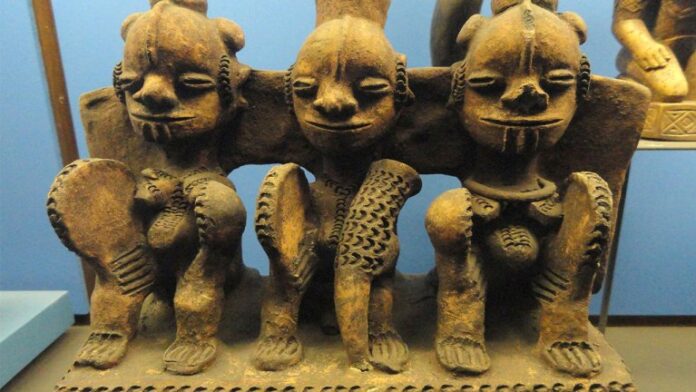Before the arrival of Christianity and colonialism, Odinani was an ancient religion that was practiced by the Igbos of Eastern Nigeria. In this practice, people would pray for a spirit that was represented by a statue called Chi. The Chi would intercede on behalf of the people who prayed to it from a Supreme Being known as Chukwu.
READ ALSO: Unveiling the Splendor of the Agbogho Mmuo Festival: A Celebration of Igbo Culture and Heritage

Other deities which were worshiped at the time include:
I.) Ekwensu, the god of bargains and mischief
II.) Ikenga, an avatar of the owner’s spirit
III.) Ala, the goddess of fertility
IV.) Amadioha, the god of thunder
In the past, the majority of the Igbo homes had small altars for the Ikenga. A Pentecostal bishop of the Royal Church in the southern city of Port Harcourt named Chinasa Nwosu is an apologetic critic of the traditional beliefs and he condemns anything related to such.
In early 90s, Bishop Nwosu was brought into the limelight when he tore down shrines, burnt idols, and uprooted what he denounced then as “evil trees”.
These ancient “evil trees” as he called had white or red pieces of cloth wrapped around their bases. They were regarded as sacred to the people who worshiped and made sacrifices to them. Most of these evil trees are found in forests away from the community while some are in the family compound.
Bishop Nwosu argued that God does not want us to practice idol worship. He further stated that the African religion, most of the time, is based on idolatry. Quoting a passage in the Bible, he added that “Blessings come when you remove those accursed things,”
According to him, the carvings and other artworks such as the Ife Heads and Benin Bronzes which were looted from western Nigeria during the colonial era and are now placed in European museums, had not been consecrated to God. Therefore, he did not disapprove of the opinion that they should be returned back to Nigeria.
Furthermore, he warned the Nigerian government that if it brought back these artifacts that could be traced to “idolatry” (such as the Ikenga wood carvings in the British Museum), he would suggest that they are burnt.

Such opinions are highly disregarded and shunned by Reverend Obayi, as he is determined to preserve the artifacts in his museum instead. He stated that the artifacts would be seen by our children and they will understand how their forefathers lived.
Today, many of these ancient religions if not all are extinct, and they suffer persecution from the Christian religion which is now dominant in the region. There have been many cases where shrines have been invaded by Christians activists. Their sacred days are no longer observed and their traditions such as rites of passages are frowned upon.
In this modern world, the majority of people who still practice these religions are mostly elderly people who are soaked in the traditions passed down from their ancestors. However, some youths are now going up against their Christian faith and embracing the ways of their ancestors.

